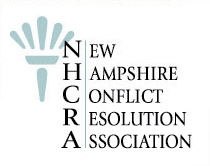Conflict is a normal, temporary and sometimes necessary part of life. Although not always welcome, if managed properly, conflict can eventually result in positive change for the parties involved. One of the key factors in determining whether a conflict will ultimately be constructive or destructive, is the method by which it is resolved.
Many traditional methods for resolving conflict can be more damaging to the relationship of the parties, than the actual dispute. While adversarial processes like litigation have their place in conflict resolution, at NHCRA, we believe that those cases are the exception rather than the rule. We think the majority of conflicts can be resolved successfully through a more cooperative and peaceable process, such as mediation.
Also, these more collaborative methods often preserve resources and relationships, while resulting in longer lasting agreements, developed by the parties themselves
Mediation
Mediation is a process for resolving issues where people attempt to reach agreement, with the help of a trained, neutral third party in a safe and cooperative setting. Mediation is forward-looking, with the mediator facilitating the communication between the parties, allowing them to focus on finding a workable solution that will help them move forward. The mediator does not offer a ruling, decision or even an opinion. The basic tenet of mediation is that with assistance, the parties to a dispute can find their own best answers. The mediator is not ethically allowed to provide legal advice or take sides in the dispute, but rather, helps the parties explore ideas and options and make their own decisions. Mediation is voluntary, confidential and non-adversarial.
Arbitration
Arbitration is a dispute resolution process in which a neutral third party reviews evidence, hears testimony and makes a decision. In binding arbitration, the parties agree in advance to accept the decision of the arbitrator. In non-binding arbitration, the decision is a recommendation that the parties may choose to follow, in part or entirely.
Ombuds
Ombuds (ombudsman, ombudsperson) are employed by companies, universities, governments and other organizations to provide independent, impartial and confidential services. Ombuds hear inquiries and complaints and ensure that everyone involved is heard without fear of retaliation or loss of privacy. They facilitate resolution of disputes or issues brought forward by employees or consumers, advocate for the needs of the clients or customers of the organization and bring systemic concerns to the attention of the organization.
Facilitation
Facilitation is a process in which a neutral person, whose selection is acceptable to all the members of the group, intervenes and diagnoses issues, to help a group improve how it identifies and solves problems and makes decisions, in order to increase the group’s effectiveness. The facilitator has no decision-making authority but works with the group to support full participation, increase mutual understanding and shared decision-making. Facilitators may work in business, education, community or other settings with group communication, planning or dispute resolution needs.
Collaborative Law
Collaborative law is a process of assisted negotiation in which attorneys and their clients try to settle their differences without the involvement of a third party. The attorneys help their clients clarify issues and negotiate an agreement. Collaborative attorneys agree not to represent their collaborative clients if they do not reach agreement, and the case ultimately needs to be resolved in the courts.
Parenting Coordination
Parent Coordinators work with parents to help them carry out their parenting plan. They play the combined role of educator, conflict coach, mediator and arbitrator. They help parents develop appropriate communication and decision-making skills. They act as mediators to help them resolve disputes. When parents are unable to resolve disputes, the parenting coordinator assists with decisions to help the parents better implement their parenting plan. The arbitration (decision-making) power of the parenting coordinator is limited to disputes about carrying out the parenting plan and other minor parenting issues. The parenting coordinator may NOT change primary residence, the amount of child support, or other key issues that only a court may decide.
Education/Training
Conflict resolution educators and trainers may be class room teachers, usually at the secondary or post-secondary level . They may also teach workshops or other community education programs. They may provide individual or group training or supervision for mediators or other conflict resolvers.

